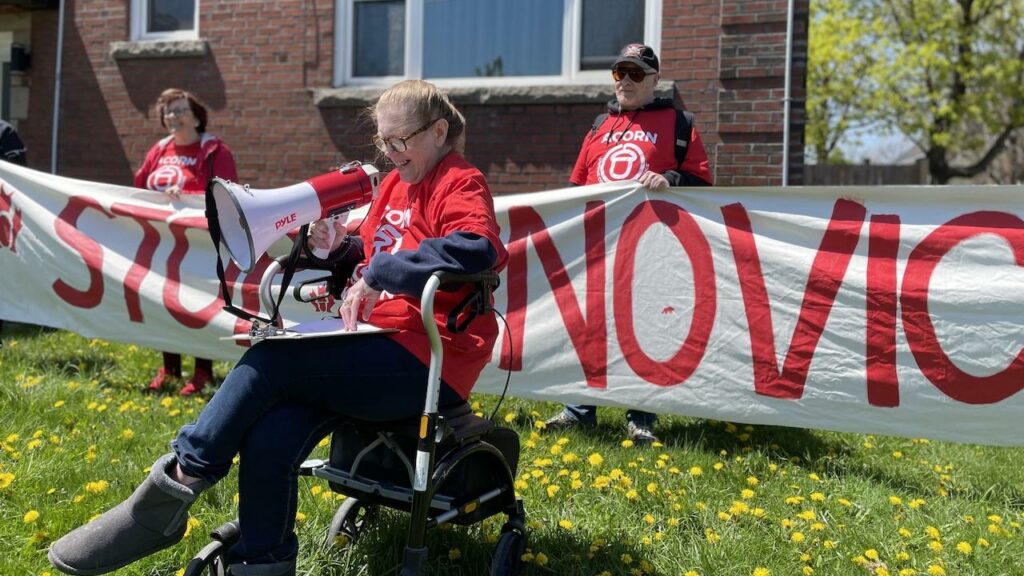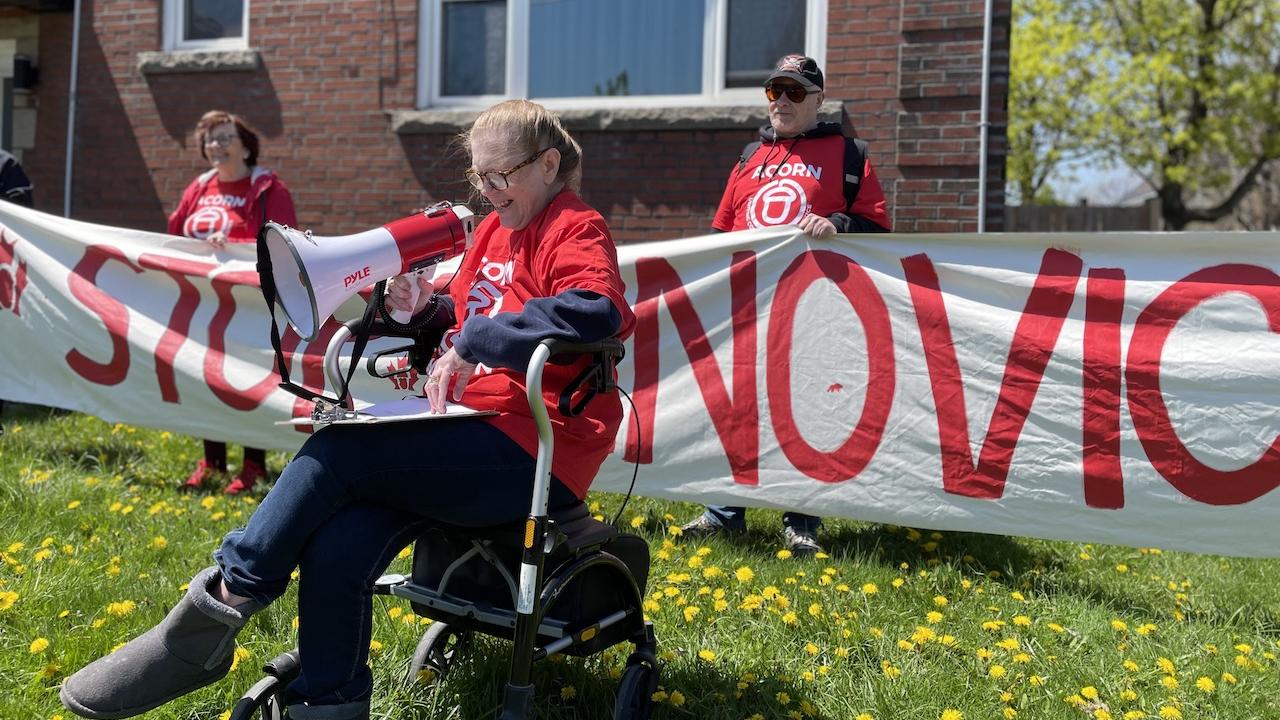TVO Today – Opinion Piece: It’s time for full rent control in Ontario
Posted May 25, 2023
OPINION: The Ford government says new regulations will help tackle the housing crisis. But the tenants being hit hardest need more action

It’s an era of new regulations in Ontario. The Doug Ford government passed Bill 23, More Homes Build Faster Act, in 2022, and then Bill 97, Helping Homebuyers Protecting Tenants Act, in April 2023. Both, the PCs say, will help tackle the housing crisis in this province by building 1.5 million homes in the next decade. However, these regulations can have a detrimental impact on tenants who are already bearing the brunt of the housing crisis.
Little new affordable housing
Bill 23 guts inclusionary-zoning policy. Last year, ACORN members in Toronto and Mississauga celebrated the passing of the IZ bylaw, an important policy tool that empowers cities to impose affordability requirements on a certain percentage of units in new housing developments. The potential of IZ was already diluted when, in 2019, the PC government restricted the application of the bylaw to within only 800 metres of major transit-station areas. And Bill 23 goes a step further: municipalities will now be limited to requiring affordability for no more than 5 per cent of the units in any housing development. And it caps the number of years these units will be kept affordable to 25 and changes the definition of affordable housing to 80 per cent Average Market Rent (AMR).
Toronto passed its IZ bylaw in late 2021, setting affordability requirements at up to 22 per cent of a new development (phased in over several years), and these were required to be permanently affordable. Even the affordable-rent definition that applied to these IZ units was to be based on household income, not AMR.
Not as strong as Toronto, the IZ bylaw in Mississauga had affordability requirements for up to 10 per cent of a new development, and affordable ownership units were to be kept affordable for perpetuity.
Cities are still awaiting a final word from the province, but these changes will render IZ totally ineffective. They’ll mean more resources in the hands of wealthy developers and a much less productive and highly constrained IZ policy in North America.
Existing affordable homes at risk
Another important legislative change relates to the rental-replacement bylaws that play an important role in protecting affordable housing: they mandate that developers ensure that the same number of affordable rentals are built and that tenants are allowed back at the same rent after redevelopment. In doing so, they ensure that existing affordable housing is not lost and that renters are not rendered homeless. Toronto and Mississauga have such bylaws in place.
The provincial government’s current efforts may end up weakening provincial law or diluting the existing bylaws and/or restricting the ability of cities to have strong bylaws to protect tenants and affordable housing. Bill 23 provided the minister with the authority to prescribe limits to municipal powers related to demolition and conversion of residential rental properties of six or more units, and now Bill 97 gives the minister authority to make regulations to create a standardized framework around municipal rental-replacement by laws.
Standardization to prescribe certain minimum standards would be good only if such standards met benchmarks and didn’t set caps to what the cities are “allowed” to do. For example, Toronto’s rental-replacement bylaw requires that tenants have the right to return to the same size and type of unit and that replacement units remain rent controlled. It also provides moving costs and additional compensation beyond what the provincial law provides for.
Ontario is losing affordable housing too fast. The housing that is at greatest risk of demoviction is purpose-built rentals, the bulk of which were built in the 1960s and ’70s. It is far easier to protect existing affordable housing than to build new purpose-built rental housing to meet the current demand. The Federation of Rental-Housing Providers of Ontario says the province will need 300,000 new purpose-built rental homes in the next 10 years just to keep pace with current demand. Steve Pomeroy, a professor who works with the Canadian Housing Evidence Collaborative at McMaster University, estimates that, each year in Canada, 64,000 existing affordable-housing units are lost — 20,000 in Ontario alone.
The government states that “More Homes Built Faster introduced changes to reduce barriers for home builders to replace older, mid-sized rental apartments with larger, more modern rental buildings.”
Tied to this piece is ensuring that existing affordable homes are kept in good repair — which brings us to the new provincial regulations around curbing bad-faith renovictions. Renoviction is when landlords evict tenants claiming they’re going to complete renovations.
Corporate landlords allow apartment buildings to fall into disrepair, and tenants are expected to move out voluntarily; if they don’t, they are offered buyouts. Many accept the buyouts as they feel intimidated or are not aware of the right to return when the renovations are complete. Even if the tenants exercise the right to first refusal (right to return), in many cases, it’s not enforced. There should be an order by the Landlord and Tenant Board to make sure that the landlords don’t re-rent the unit to a new tenant once the renovations are complete.
But neither more money for the provincial LTB nor increased penalties for landlords are real solutions, as the responsibility to prove bad-faith evictions — which involves an onerous process — falls on tenants.
The way forward
It’s time for full rent control in Ontario. It would take away landlords’ financial incentive to evict tenants. It would force landlords to keep units in good condition and save thousands of affordable homes. We want all units to be under rent control. And the province should implement vacancy control, which would tie rent control to the unit so that, when a tenant leaves, a new tenant cannot be charged any amount the market allows. Finally, we must have a ban on above-guideline rent increases, which allow landlords to do cosmetic repairs and increase the rent more than the provincial guideline.
The PC government may not agree, but full rent control would be a game changer.
****
Authored by Alejandra Ruiz-Vergas and Darlene Wesley for TVO Today
Alejandra Ruiz-Vergas is the chair of the East York Chapter of Toronto ACORN and a board representative for National ACORN, a community union of low- and moderate-income tenants; Darlene Wesley is an ACORN member in Hamilton.

